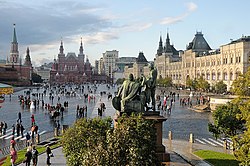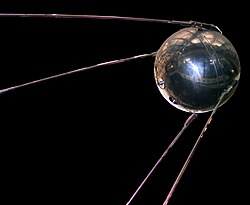As reported in various media outlets this week, including The Next Web and The Daily Dot, this past week, Wikimedia Commons and various language Wikipedias are working together to encourage subjects of Wikipedia articles to record a 10-second clip of their voice to be appended to their Wikipedia article. The goal of the project, which was originally proposed by Andy Mabbett, is for posterity to have the ability to know what someone's voice sounded like, as well as to have a definitive pronunciation of their name. Thus far, Charlie Duke and Stephen Fry are among the relative few that have participated. There are some concerns, not the least of which is sound quality, however, The Daily Dot perhaps aptly pontificated,
| “ | As for Fry's inaugural voice sample, well, there have been some gripes about quality. But what's more important, a crystal-clear recording, or the preservation of that perfectly British "um" for posterity? Besides, things really sound more historical when they're this grainy. | ” |

In case you had not yet heard, there is a major gender gap amongst Wikipedia editors, and consequently Wikipedia articles. On Saturday, 1 February 2014, Wikipedians new and old congregated on college campuses, libraries, or their own homes seeking to improve that gap and bias. They worked on articles with topics ranging from female artists to feminists themselves to important events in the women's rights movement, and as evidenced by the results, it was a success, with dozens of new articles being created, and subpar articles being improved.
Several involved Wikipedians expressed optimism and satisfaction with the event. Daniel Case noted that efforts such as this edit-a-thon are important because "having a diverse array of viewpoints represented among editors ensures that we will be able to write more comprehensive articles." He also expressed optimism on how the event attracted and mentored new users, commenting, "I think it helped a few new people get over the mystique and realize that they, too, can edit this thing." Girona7, another experienced Wikipedian, made the following comment in regards to the event she attended:
| “ | We had a lovely turnout considering we weren't even sure we were going to be able to hold the event on short notice. Our hosts from the SMFA were fabulous; I would love to hold events there again should the opportunity arise. Our eight attendees were split between established editors and newbies… I spent a good amount of time tutoring individuals who needed assistance and basic introductions to Wikipedia markup. In all we created two new articles and improved four others during the event—mainly these were biographies of individual artists. I was definitely proud to be a part of this well-coordinated event. It is high time that more women in the art world get the recognition they deserve … we look forward to continuing these efforts as the year progresses. | ” |
| “ | In Portland, I estimate there were at least 40 participants who attended the event, which was six hours long and was held at Portland State University. Nearly a dozen Wikipedia articles were created, and more than twice that number were improved. Participants had many of their questions answered and were supplied educational brochures created by the Wikimedia Foundation. There was great interest in organizing similar events in the future, and I've heard there are already plans to host another arts edit-athon in April. | ” |
Interested readers can find full results here.
Below is an non-exhaustive list of publications that covered the event:

IMS Health, a large United States-based health communications organization, recently published an report asserting that half of physicians have, at one time or other, consulted Wikipedia for information on various ailments that may afflict their patients. Similarly, patients have also consulted Wikipedia for information on what may plague them. Perhaps most shocking, there is a correlation between the amount of views on Wikipedia pages, and treatment courses of action physicians have pursued:
| “ | The top 100 English Wikipedia pages for health care topics were accessed an average 1.9 million times over the course of the past year. And analysis of prescription drug sales found a correlation between page views and medicine use.
"Increasingly, patients are turning to social media as an essential forum for obtaining and sharing information related to their health," Murray Aitken, executive director of the IMS Institute for Healthcare Informatics, writes in the report. |
” |
Consequently, some doctors, professors, and medical students are seeking to ensure that Wikipedia's medical articles are stocked with information from reliable sources so that people do not obtain incorrect or potentially harmful information. ITM consulted WMF spokesman Jay Walsh for comment pertaining to the issues that Wikipedia can have with medical articles, as well as this new initiative from medical academics. In regards to a recent proposal to append a disclaimer to all medical articles, he noted that while he "is glad to see that this is an important conversation within Wikipedia", WMF "does not think additional disclaimers are legally necessary", but appreciates the conversation that ensued on both sides on how to best serve readers. While he did not comment specifically on the latest endeavor by some medical professionals and students to improve medical articles, he did note,
| “ | The Foundation is always happy to see more subject matter experts get involved with Wikipedia, particularly when those new editors are getting solid guidance on the principles and policies of Wikipedia and norms and best practices of collaborating with the community. You can look to several years of great work by the Wikipedia Education Program to see how much the Foundation supports initiatives such as this. | ” |
Several newspapers and publications covered both the report, and ensuing initiative. Herein lies an unexhaustive list:

A Monitor TV programme on German television on 30 January 2014 (transcript) highlighted covert PR work in Wikipedia, describing such manipulation of a website that has a de-facto monopoly on providing information to the internet public as a potential "problem for democracy".
The programme featured an interview with Malte Landwehr, a PR consultant who stated that he knew of a number of PR agencies who had Wikipedia administrators on their staff and said that the use of sockpuppets to alter articles and manipulate discussions was widespread.
Another PR consultant interviewed for the programme expressed satisfaction with a Wikipedia article on a particular building style, "Schwedenhaus", that she had placed in Wikipedia to promote the business of a company specialising in prefabricated houses of that style, under that name. The article featured several pictures of the manufacturer's products, with the company's name and website noted on the image description pages in Commons. Shortly after the broadcast had ended, the Wikipedia article—which had existed for close to two years—was nominated for deletion (the article was eventually kept, although in much shortened form, and without the manufacturer's pictures). The user who created it was blocked by an administrator the same evening.
Pavel Richter, the head of Wikimedia Germany, and Dirk Franke, who for the past year has been conducting a paid-editing study funded by Wikimedia Germany, also appeared in the programme. The programme has been discussed at length in the German Wikipedia, in particular on the talk page of the German Wikipedia's Kurier newsletter.
The topic of PR editing is currently in the public eye in Germany, after a study published by German investigative journalist Marvin Oppong last month asserted that PR manipulation in Wikipedia is widespread.
Other media outlets reporting on the issue in recent days included the Berliner Zeitung, which in this context also mentioned Wiki-PR (covered extensively in recent issues of the Signpost), Main Post, Badische Zeitung and T-Online.de.

Azeri news site news.az reported on 24 January 2014 that IRELI, a youth organization that recently won a "Best of the Best" award from the Azeri government, will "launch WikiDays project in partnership with Wikipedia Azerbaijan." The announcement said,
| “ | Professional trainers will hold training and seminars about how to create and edit Wikipedia articles, to protect Wiki-articles, Wikimedia fund, principles of propaganda in Wikipedia and other issues as part of the project. The project aims to encourage the youth to use Wikipedia in a correct manner, to protect interests of Azerbaijan in Wikipedia and prevent distortion of information about Azerbaijan. | ” |
This initiative should raise concern in the Wikimedia movement, and the Wikimedia Foundation. Azerbaijan's president, Ilham Aliyev, has been named a "predator of freedom of information" by Reporters Without Borders, who say that unauthorised coverage of the president and his family is "completely off-limits for the media". In this week's release notes for the new 2014 World Press Freedom Index, developments over the past year in Azerbaijan are summarised as follows:
| “ | More repression is also the strategy being adopted in Azerbaijan, where the very survival of media pluralism is in danger. The TV stations are under government control, the main foreign radio stations are banned, and the main opposition newspaper barely circulates except in the capital and is on the verge of financial extinction. At the same time, recalcitrant journalists and bloggers are exposed to physical attacks, death threats, smear campaigns and abduction. Will the emergence of new alternative exile media save pluralism? | ” |
The situation is similar in Turkmenistan, Uzbekistan and Kazakhstan—the other three ex-Soviet countries described by Reporters Without Borders as being run by "oil and gas despots" who escape international censure because of their countries' mineral wealth and strategic importance. Azerbaijan is now listed at no. 160 in the 2014 World Press Freedom Index.
Software evolution does not always mean that features are being added. It also means that old fat is being trimmed. It is no different for MediaWiki. A while ago, developers started discussing about removing some user preferences to reduce "option bloat" (see also Bugzilla:52807). Last week, the advanced options dealing with page presentation (such as how to format links to non-existent pages, and whether to justify paragraphs) were removed, and it did not go unnoticed, but discussion did not grow to VisualEditor-esque proportions.
Highlights from Tech news:
In a bold move, the Wikimedia Foundation's Board of Trustees has announced a major change in policy concerning affiliated groups in the worldwide movement, and Funds Dissemination Committee (FDC) funding levels to eligible chapters and thematic organizations over the next two years. Both decisions were published last Tuesday after considerable post-meeting consultation with the FDC and the Affiliations Committee (AffCom). The core of the first decision is:
| “ | The WMF Board will only approve new chapters and thematic organizations that have been a user group for two years with demonstrable programmatic results, and whose application is supported by the Affiliations Committee. | ” |
Here, “programmatic results” refers to activities that are likely to improve the quality and prospects of the Foundation’s online projects. The motion was put by Phoebe Ayers and seconded by Stu West—and since the voting of each trustee is now put on the public record as the result of a change in practice in early 2012, we know the details of the vote: seven trustees voted for the motion: Phoebe Ayers (community-elected), Jan-Bart de Vreede, Ana Toni, Stu West, and Bishakha Datta (all appointed for their "specific expertise", and the last-named a Board representative on the FDC), Jimmy Wales (co-founder), and Alice Wiegand (chapter-selected). Three trustees voted against: Sam Klein and Maria Sefadari (community-elected), and Patricio Lorente (chapter-selected trustee and Board representative on both the FDC and AffCom).

The Board's announcement has put the concept of user groups on a new structural footing: they can function either as a means in themselves or as a stepping-stone towards eventual recognition as a thematic organization or chapter. By definition, user groups comprise at least three people who do offline work; they are eligible to use the WMF's trademark and to apply for funding through the Foundation's Project and Event Grants Program. Nine user groups have already been approved, covering Wikimedians in the following fields: Wikisource, Brazil, GLAM-Wiki US, Greece, Esperanto, New England, San Francisco, Nepal, and Groups/Promotion. A step-by-step guide explains the pathway towards affiliation by AffCom.

The second major announcement by the Board caps the total amount of funding that can be allocated to eligible chapters and thematic organizations:
| “ | We expect to be capping the allocation for FDC Annual Plan funding at approximately its current amount, for the years 2014–15 and 2015–16. We want to make the FDC and all recognized movement entities aware of this now, so they can plan accordingly. The amount allocated to the FDC process will be revisited during the Wikimedia movement's next strategic planning cycle, and the number may therefore change in 2016–17. | ” |
This motion was also put by Ayers and seconded by West. The voting was the same as for the previous motion, except that Alice Wiegand opposed.
Both decisions come after clear signs of growing concern by the Foundation about budget and staffing growth, lack of demonstrable impact on WMF sites, and governance among eligible affiliates, which are strongly weighted towards the global north. Last August, WMF executive director Sue Gardner asked "whether the benefits are turning out to be worth the costs" of "setting up bricks-and-mortar institutions". The Board is the only body with the power to make these decisions: it alone is charged with determining the mission, goals, long-term plans, and high-level policies of the WMF and its projects; ensuring the sustainability of the organization; and maintaining legal and ethical integrity. It was the Board that restructured the financial arrangements of the movement in 2012, in the process creating the FDC and forging the major policies that govern the WMF's evolving responsibility as grantmaker; it was also the Board that recently reformed the WMF's trademark policy, in the process making it more accessible to user groups and other members of the movement.

Given the significance of the announcement, Ayers took the unusual step of explaining the decision-making process on the public Wikimedia mailing list (stressing that this was her perspective, not a Board statement). Her account suggested that there was extensive debate among the trustees about the issues, and that the ramifications of the motions were treated with considerable weight and care. We have summarized what Ayers wrote:
With significant funding and shifts in movement structure at issue, it was understandable that the decision might have prompted criticism, although the personal nature of Rupert Thurner's opening shot was a surprise to many: "i am disappointed personally by you. you as a person, you as an american, and you as a board member of the foundation. especially about your inability to grasp international cultural differences in terms of funding, fundraising."
Subsequent commentary, while mostly critical, was more measured. Frédéric Schütz, of the Swiss chapter, argued that the trajectory towards chapter or thematic organization forbids a user group from incorporating and having bylaws. He wrote to the Signpost that in Switzerland that would mean "they first have to live two years in a legal limbo, which prevents them from handling any money or contract—and basically prevents them from doing anything useful as a group (except meetings as friends). / Contrary to what the board says, becoming an incorporated entity does not necessarily imply a large bureaucratic overhead, and then it makes sense in many cases for [a user group] to incorporate." On the mailing list, he wrote: "The burden of the proof should be on the WMF board to explain why this proposal makes sense, and what positive outcome it brings to the community—not on motivated community members who have to beg to get exceptions."
Trustee de Vreede's response to these points was: "We are saying that a track record is ... much more important that the previous focus on having bylaws. This because we know that a proven track record is a very good indicator of the [subsequent] chances of success of a chapter or thematic organisation. / Hmmm ... I would say that:
The chair of AffCom, Bence Damokos, wrote: "Speaking in my personal capacity, I echo the surprise that the Board has decided to move a motion before they had full or close to full consensus on the issue—which is in general a departure from the usual." This provoked comments that the Board makes decisions on a majority vote, by its constitution. The chair of the FDC, Dariusz Jemeilniak, stated that the FDC itself "have not participated in consulting or idea exchange in any systematic way" on the decisions.
Lodewijk Gelauff of the Netherlands chapter, who is also a member of AffCom, complained that the decision "is very bad for the volunteers", and that in his view, AffCom "was not consulted by the board on this topic [but] on a different (but related) proposal by a staff member, with very different arguments from those that the board used in their discussion. In my feeling the board is painting an unjust and unfair picture of the consultation that took place." In a long message, Nicole Ebber, the project manager of Wikimedia Germany, was critical of giving user groups an elevated role, "since there is hardly any structured support for these young and aspiring volunteer groups to grow, to develop and to become trusted partners, ... / The most pressing question here remains: In an ideal world, how would an organization model for Wikimedia look like? And does the restriction of choices for affiliations' models help us to reach this goal?"
Trustee Sam Klein wrote: "The WMF also wants to let all groups have easier access to trademarks and funds. This is what user groups were designed to allow, with minimal overhead. These two ideas were combined into "be a user group for two years". This garnered a positive response from one participant: "This part I do think is a good idea. There are many models of how individuals and groups participate and organize themselves within the global Wikimedia movement besides the umbrella Wikimedia Foundation, and imo the previous organizational/funding focus overlooked those who didn't fit one specific model: national Chapters, i.e. organizations seeking to represent Wikimedia-movement activities in a general sense, within the territory of one nation-state, and usually in a fairly "official" manner (paid staff, boards of directors, political visibility, etc.). I like that initiatives such as the individual-engagement grants, user-group recognition, etc. are opening up more avenues for Wikimedian organizations, organized along different lines, to find a more recognized (and funded) role in the movement.
To those who have expressed the view that becoming a user group imposes some kind of penalty, Ayers made the point: "If a group goes from no Wikimedia recognition to being a user group they go from no access to resources to access to the Wikimedia trademarks, access to grants big and small, listing with other official groups ... it's a big change. Of course groups might want to become a chapter later on, but that's not exactly always an easy process ...".
The debate continues on the mailing list.

This Signpost featured report covers content promoted from 19 January to 1 February. Text is taken from the featured articles and lists; see those pages for attribution.

Sixteen articles were promoted to featured status.
Three lists were promoted to featured status.



Twenty five pictures were promoted to featured status.

Summary: Ah, sports! I am sure that I share with most Wikipedians a fairly good opinion of the roundness of my own knowledge, at least in certain areas. It is a bold mind indeed that embarks on a longterm Wikipedia career without first winning a few rounds of Trivial Pursuit. However, the one topic about which I can safely declare myself utterly clueless is competitive physical activity, as evidenced by the fact that most of my free time is spent in front of a computer screen. So when two great sporting events, the Super Bowl and the Winter Olympics, collide in one week, transforming the top 25 into a festival of flying feet, a carnival of colliding craniums and a bacchanal of bouncing balls, I find myself at the foothill of a rather large amount of research. So if the commentary seems a bit less colourful than usual, that's why.
For the complete top 25 report, plus exclusions, see WP:TOP25
For the week of 2 to 8 February, the 10 most popular articles on Wikipedia, as determined from the report of the 5,000 most viewed pages* were:
| Rank | Article | Class | Views | Image | Notes |
|---|---|---|---|---|---|
| 1 | Philip Seymour Hoffman | 4,755,765 |  |
The sudden, unexpected death of this intensely talented, Oscar-winning actor at the age of only 46 sent ripples throughout the pop-culturesphere. Although the coroner has yet to confirm the cause of death, evidence found at the scene suggests that he relapsed into heroin use after a long abstinence. | |
| 2 | Bruno Mars | 1,190,624 |  |
Despite having only been on the scene for three years, this singer has already sold over 100 million records, and he shot into public consciousness this week not only by winning Best Pop Vocal Album at the Grammys, but by presiding over a widely praised Super Bowl halftime show. | |
| 3 | 2014 Winter Olympics | 1,060,738 |  |
The 2014 Winter Olympics opening ceremony fell on February 7. Thanks to Russia's vicious anti-gay laws and roundly condemned political imprisonments, this has become, whether it wanted to or not, a lightning rod for modern civil rights protest. | |
| 4 | Satya Nadella | 800,101 |  |
The new CEO of Microsoft has a lot to deal with. Not only must he assume the mantle of a charismatic and universally known predecessor, but one whose shadow will likely fall on all who follow him, he must re-orient a company designed for the PC market in a world now dominated by tablets and mobile devices. It's somewhat surprising to see him so high on this list, but again, the India effect doubtless played a role. | |
| 5 | Russell Wilson | 723,018 |  |
The defeat, or rout, if you prefer, by the Seattle Seahawks of the Denver Broncos that comprised this year's Super Bowl was distilled in the media to a battle between the two opposing quarterbacks—one a veteran approaching the end of his career, and this one, a newcomer led his team to their first Super Bowl win ever in just his second year in the league. | |
| 6 | Sochi | 721,216 |  |
The sub-tropical resort that Vladimir Putin for some reason chose as the ideal location to host the Winter Olympics has become something of a talking point, given that it is one of the few places in the entire country that doesn't get snow in the winter, leading to the slightly ridiculous scenario of a country that regularly sees double-digit below zero temperatures having to spray artificial snow. | |
| 7 | Super Bowl XLVIII | 672,744 |  |
With 111.5 million viewers, the largest amount in US television history, the great American event enters the top 10 for obvious reasons. | |
| 8 | Peyton Manning | 610,853 |  |
A popular five-time MVP who played for the Indianapolis Colts for 14 seasons before leading the Denver Broncos to the Super Bowl, Manning was framed in the media as the protagonist in a mano a mano battle with opposing quarterback Russell Wilson (see above). | |
| 9 | Woody Allen | 606,319 |  |
The film director responded to an open letter from his onetime adopted daughter this week, dismissing accusations that he had sexually abused her, and reigniting smouldering debates about his behaviour. | |
| 10 | 587,794 |  |
A perennially popular article |





In celebration of the 2014 Winter Olympics in Sochi, we revisited the team at WikiProject Russia to learn how the project has changed since our first interview in 2011. The project is currently home to 115 pieces of Featured material and 287 Good Articles. we interviewed Ezhiki and Ymblanter.
Next time, we'll discuss some of Wikipedia's shortcomings. Until then, explore our vast archive.
Reader comments

